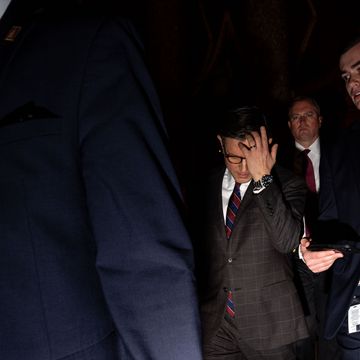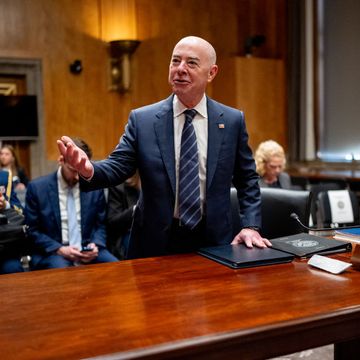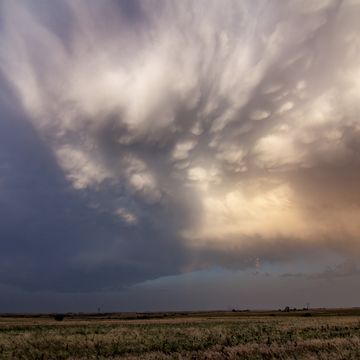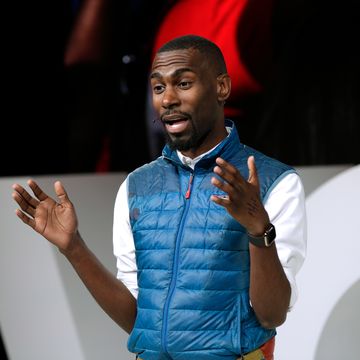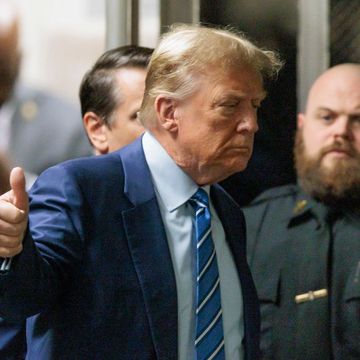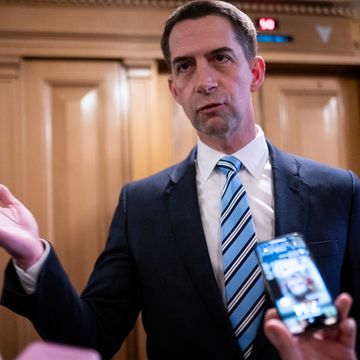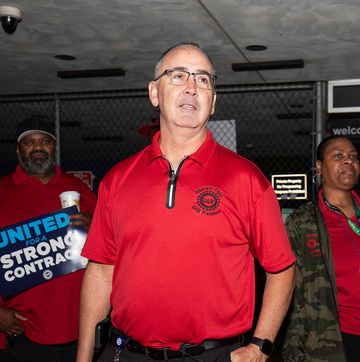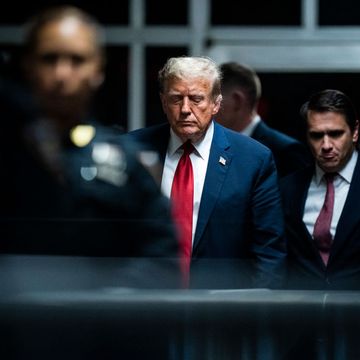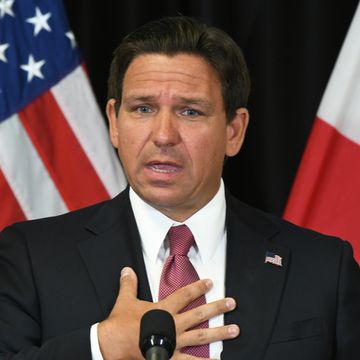Published in the November 2012 issue
In Montana there are ranches and there are farms, and they are different places run by different people. The ranches are enormous, tens of thousands of acres of brown campfire flats interrupted by little ground ripples and dotted by the familiar black silhouettes of distant cattle. They, not the landscape, are the most defining features of the ranches: A ranch isn't a ranch without animals — and here that means not cows but cattle or even "beef," because there's no pretending that most cows in Montana are born to be anything other than meat. The men who mind the beef are called ranchers, unless you're someone like Dennis Rehberg, Montana's at-large representative and now its Republican candidate for the U. S. Senate, in which case you're sometimes unfavorably cast as a "gentleman rancher," the modifier meant to distinguish those who own property and horses from those who work it and ride them. Farms, on the other hand, are usually much smaller than ranches and home to crops and crops only, and the families who tend them are called farmers. Jon Tester, Montana's Democratic incumbent and Rehberg's opponent in the most contentious and nationally important election in this state's curious and bloody history, is a farmer. More specifically, he is an organic farmer, and he sometimes adds his own modifier — "working" — as a way to separate himself further from gentleman ranchers.
Tester works on his farm raising wheat, including hard red and hard white, barley, and something called Kamut, a strain of wheat that's more easily tolerated by people with wheat allergies. The Kamut is all that's left on this sauna-hot August day, the last day of harvest. Virtually all of Tester's campaigning has come to a stop for the last two weeks while he's sat on his combine, mowing his spread about ten miles west of Big Sandy, in north central Montana, population 595. It doesn't matter that this election, like the last one, will come down to a few thousand votes. (Tester was elected in 2006 by just 3,562 votes out of the nearly 407,000 cast; he beat Conrad Burns, who had held the seat red for eighteen years.) Nor does it matter that the balance of power in the Senate might rest on whether the Democrats keep their tenuous hold on Montana. For Tester, the most pressing concern has been getting in his crop before it dies in the fields, like the barley that was just hailed out during a thunderous storm a few weeks ago. Those barley fields are pretty much crippled, but a healthy harvest of wheat has been stripped and binned. The peas that Tester grows for fertilizer — pea plants load the soil with nitrogen — have also been plowed under. Now he has filled his two trucks with the last of his Kamut, which he has to deliver to the elevator at Fort Benton, about twenty miles south. He'll drive the first truck, the sun-bleached Peterbilt; his wife, Sharla, will drive the more compact second. By the time they come back tonight, the harvest will be over, and at last the political cull will begin.
Tester comes up the basement stairs wearing filthy jeans and a long-sleeved collared shirt that might have been white at one time but is now wet with sweat and caked with dust. A battered ball cap covers his trademark flattop, which has wilted in the heat. Sharla has pulled a frozen pizza out of the oven and spooned out some macaroni salad; Tester lifts just a single piece of pizza without sitting down. The house, which the Testers built themselves twenty years ago, is very clean but sparsely furnished and almost devoid of mementos. The Testers are not sentimentalists. They do not accumulate. "You all set?" he says to Sharla, and they head back outside, squinting into the sun bouncing off the stubble in the fields.
This farm has been in his family since 1912. The original barn was fast carried off by a tornado, but a red wood barn that took its place in 1916 is still here. (The barn is featured prominently on his election signs; the word DEMOCRAT is conspicuously not.) So is the original windmill, mostly stripped of its vanes, and the old house, which sits crumbling nearby. "We have to get that taken down," Sharla says, but it's not unusual for farms here to have the remains of two or three different houses on them, dating all the way back to the first homestead, collapsing into a heap. They are used until they are no longer of use, and then they are left to the elements.
Tester climbs into the cab of his rig and fires it up. The Peterbilt's from 1986, and it's beat up and loud. "It's a good old truck," Tester says. "I bought it, I didn't know jack shit what I was looking at. I've put a fair amount of money into it, but not bad." He eases it, shaking and rumbling, down the long dirt driveway that will take him to dusty Son Lane, which will lead him to the two-lane blacktop, the 87, the only road that runs between Great Falls and Havre, with Fort Benton and Big Sandy in between.
It isn't long before he spots the first flash of bright red. Soon there's sign after sign for Rehberg crowding the road, poking out of fields, banged into fence posts. (Tester's signs are blue but a muted blue.) This is Republican country for the most part, east of the Continental Divide. In the western half of the state, in the mountains, in college towns like Missoula and in union towns like Butte, Tester has the advantage. But the flats, the ranches at least, belong mostly to the Republicans. All these signs, and Tester's barn isn't on any of them.
"Here's the deal," he says. "This, all this... I just went to Milk River, and you know how many Dennis Rehberg signs I saw? None. That's a two-and-a-half-hour drive along Highway 2. Never saw one. These signs on this road" — this road, the one that Tester must take if he wants to deliver his crops to Fort Benton or fly back to Washington, D. C., out of Great Falls, this road, the single path out of Big Sandy — "are here for one reason and one reason only." Each flash of red is another little poke to the ribs, another little jab designed to wear Tester down. They represent the mutineers, and on the road between Big Sandy and Great Falls, at least, it can sometimes look as though they have him surrounded.
Just then, he spots one more sign. It's the same as all the others. The only difference is that this one's on a farm. Tester leans forward when he first spies it in the distance and then cranes back as he roars past it, trying to make sure he's seeing what he's seeing. "What's Harvey doing?" he hollers over the engine. "That's my neighbor! Goddammit, Harvey. That's my wine-drinking buddy!" He slips down his seat and looks into the side mirror, back at his wife in the second truck. He sees that she sees it. "Sharla will call him," he says. He's not joking. Sharla will call Harvey because in a fight this close, Harvey and his sign might make all the difference in the world.
There is another sign at the bottom of the 87, just north of Great Falls. Tester sees it every time he comes home from Washington, which means he sees it just about every weekend. ("I spend sixteen to twenty-four hours each week either on an airplane or in an airport," he says. "I don't do that because I love to fly.") The sign went up a few years ago, during the height of the debates over Obamacare, to which Montana was generally unreceptive. Tester has now driven past it a few hundred times, and it's big and yellow and hard to miss: ELECT ANYONE EXCEPT JON TESTER AND MAX BAUCUS. (Baucus, another Democrat, is Montana's senior senator.) A private citizen put up the sign and, year after year, has paid to keep it up. It's become a kind of staring contest. "The first time I saw it, I thought, Wow, somebody must really hate me," Tester says. "That person was probably pretty mad at me, and still is pretty mad at me. My folks always said, 'Let them be mad at you.' But I also think it would be criminal if people weren't allowed to do that."
The problem for Tester, of course, is that between his last election and this one, the Supreme Court decided that not just private citizens but third parties like the advocacy group Citizens Unitedwere also allowed to do that. They could put up tens of thousands of signs. They could also take out ads in the newspaper and on the radio and TV — an unlimited number of ads paid for with uncapped and largely mysterious corporate donations ("dark money") funneled through super PACs operating allegedly independently from the candidates themselves. That's how a working farmer from Big Sandy, Montana, finds himself at the center of one of the most relentless and withering negative ad campaigns in American electoral history, at the heart of the harsh reality of that ruling. The outside money has been pouring in to both sides, and to vicious effect, which makes perfect strategic sense.
The Republicans need to turn four states to seize control of the Senate (three if they also win the White House). To turn Montana, they need to turn only half of 3,562 voters, plus one. In a state where even the biggest media markets — Billings, Bozeman, Missoula — remain relatively affordable, the math becomes even more attractive. According to Tester's campaign, Karl Rove's Crossroads Grassroots Policy Strategies has spent almost $3 million here alone, part of nearly $7 million that has been spent almost entirely on negative, third-party advertising against Tester. Most of the spots try either to link him to President Obama — who lost Montana in 2008 and will lose it by a larger margin this time around — or to paint Tester as a rube who's been blinded by the bright lights of Washington, the make-believe good ol' boy who's suddenly on the take and spending recklessly. (According to one of the Crossroads ads, "On Tester's watch, Washington's debt exploded by $6 trillion," a sentence that pulls the trick of being factual and hugely misleading at the same time.) It's become such a wild, wicked frenzy, Tester's name hasn't even been spelled right in several of the ads.
It's one of the few topics of conversation that genuinely upsets him. Today in his truck, he's been shouting a lot, especially when he flips the purple switch that throws the groaning engine brake, but when he talks about the Supreme Court decision that opened the vaults, about Rove and the Koch brothers, he's shouting not just because he wants to be heard. "The Supreme Court, which is full of a bunch of smart people, did not make a smart decision. It's just a bad decision for democracy. Karl Rove can be Karl Rove because of that decision.... It's a multifaceted effort to try to make me into something I'm not.... Millions of dollars, all negative. All negative. You know why? I'll tell you why!" — now Tester is baring his teeth, he's really lit up — "Because they can't beat me unless they make me something different! They can't beat me unless they make me into something that I'm not!"
How has Tester tried to fight back? In one of his own ads, he reads a long list of roll calls in which he voted against Obama and the Democrats — voting for the Keystone pipeline, for instance, or to have the gray wolf removed from the endangered-species list, and quashing proposed "ridiculous EPA farm-dust regulations." The Tester campaign has also ramped up the negative against Rehberg, e-mailing reporters daily reminders of the Republican's knack for lapses in judgment, such as a drunken boat accident in 2009 — Rehberg was not the driver — that left an aide with a serious head injury, and his ugly lawsuit (probably justified, but since dropped) against Billings fire officials who let a controlled wildfire get out of hand on his property, which he's been turning into a subdivision.
Mostly, however, the Tester campaign has tried to turn all that outside influence against Rehberg (who, like Tester, stayed away from his party's national convention as a presumed sign of independence), hoping to paint the gentleman rancher as the true man for hire. It's a charge that has a chance to stick, if only because Montana has a long and proud tradition of anticorporatism. Montanans aren't always everything they're made out to be — some impossible cross between the Unabomber and the laconic fishermen from A River Runs Through It — but when they talk about wanting to be left alone by the outside world, most of them actually mean it.
A poor crop: Top, the original news photo of Tester greeting Obama in 2009, with a third man extending heis hand barely visible on Tester's left; bottom, the version from a Republican campaign ad, seeming to show Tester with an intact left hand.
In 1912, the state enacted its own Corrupt Practices Act, several years after copper king William Clark bribed members of the state legislature to vote him into the U. S. Senate. (The Senate decided that Clark did not belong there; the Seventeenth Amendment to the U. S. Constitution owes a debt to him.) Last year, Montana's Supreme Court defiantly upheld the 1912 act — which banned corporate donations to campaigns — only to have it struck down again by the U. S. Supreme Court, which confirmed its own Citizens United decision. During a debate, Tester renounced the super PACs and their millions, but Rehberg disagreed, saying that the court had been right in its judgment. Republican war horse John McCain, however, called Citizens United "the worst decision of the United States Supreme Court in the twenty-first century," which gave Tester's campaign some kind of opening when McCain visited Montana in August to lend his support to Rehberg. "Senator John McCain — Welcome to Montana and thank you for standing with Montanans against Citizens United," read a full-page ad in the Great Falls Tribune. "Please join us in asking Congressman Dennis Rehberg why he supports this dangerous, out-of-touch Supreme Court decision."
The money has continued to flow, however. Tester has also benefited from spending by out-of-state groups, including the Democratic Senatorial Campaign Committee, various women's organizations, and Planned Parenthood. (His campaign says that he's received about $2 million less in third-party support; Rehberg's team disputes that figure.) But in the end, Tester's best weapon in this often bizarre and desperate Montana brand of brawl is at the moment hanging out his truck window, catching the wind outside Fort Benton. The Kamut elevator is in sight, up on the hill outside of town, and Tester brings his left hand back inside to grab its share of the wheel. And contrary to appearances in a clumsily cropped photograph of him embracing Obama, featured prominently in one of the third-party ads, that hand is still missing all three of its middle digits.
Tester does not hide his altered hand. It's rarely stuffed inside a pocket or folded behind his back. He had only nine years with the original and has lived nearly forty-seven years with this version of it — long enough, in some ways, that he doesn't see it as damaged anymore. It's just his hand. When he climbed into his truck earlier today, he opened the door with just his lonely little finger, with what must be one of the nation's strongest pinkies slipped under the silver latch.
He mostly makes jokes about his misfortune. "I screwed up, all right?" he says, smiling. "You know, it's allowed me to do some things that might have been more difficult — you know, like in new cars, how it's hard to get up and change the oil filter? I can get right in there." In Fort Benton, he finally spots a pair of his signs. "A handful," he says, extending his thumb and little finger, a permanent "Hang loose." But he must have terrible memories of the accident all the same, and it doesn't take much imagination to see how the day he lost those fingers changed him forever.
He was grinding meat the way that has always made farm kids grow up quicker, pushing beef into the swirling machine. The rhythm of that work, the noise, the machine itself — they can combine to put even an experienced man into a trance, and they put young Jon Tester into one. He was mesmerized, as though he had been looking into a whirlpool for so long that he hadn't realized how much it was also sucking him in. His little hand was pulled into the machine, and those three fingers were mangled beyond repair. There must have been a lot of blood and screaming. He can remember how for years the trio of flat stumps remained tender; a knock across all three could crumple him to the ground. His parents must have felt a little heave in their chests every time he did. "But my folks never treated it like a disability," Tester says. "They always had high expectations."
Around Big Sandy, damaged hands weren't unusual, exactly; Tester was actually the third self-tailored generation in his family alone. His grandfather had blown apart his hand with a shotgun, leaving it shaped like a shovel. His uncle, a carpenter, had lost a few of his own fingers to a troublesome band saw.
Because of where Tester grew up, out here, his left hand might have even helped him in a strange way, and not just as a makeshift oil-filter wrench. He went to school with the same thirty-five kids, give or take, from his first grammar-school recess to his high school graduation. When he showed up with his bandaged hand, and when those bandages were removed to reveal his new reality, Tester's schoolmates did what kids do, because kids can be unholy assholes. "I was very, very fortunate, because they harassed the piss out of me, but in a loving way. And if anybody else gave me shit, they were the first ones to back me up." Just as those three stumps eventually stopped their complaining, the rest of Tester's skin had been given the time and wear to grow thicker, too, thick enough to make ignoring big yellow signs erected by people who must hate him possible. If he were in a comic book, his hand would be part of his creation myth. It would be the source of his immeasurable power.
Instead, Tester risks being swallowed whole by the fight of his life, and for maybe the first time during the course of it, he found himself delighted to be absent those three vanished fingers. In a campaign filled with distortions and lies, missing fingers are the most uncompromising vein of fact. They are undeniably gone.
Except in that cropped picture. It was a 2009 Reuters photograph in which the president and Tester appear about to embrace. There is also a third, mystery man in the mix. Just a thin sliver of his back is visible behind Tester's, along with his fully formed left hand, which extends between Tester and Obama.
When the National Republican Senatorial Committee used that photograph in one of its ads, someone cropped out everything but the president and Tester — and that floating hand, all five fingers of it. Through sublime ignorance or an unlikely attempt to deny Tester his farmer's hand, the photo suddenly had the appearance of a fake, which meant that it wasn't much of a challenge for the Tester campaign to make every claim in every one of those ads seem fake, too. "Fingergate," they called it in Montana. The same ad claimed that Tester "received more lobbyist money than any other D. C. politician," more than $176,000, citing the Center for Responsive Politics. Tester can rebut that, but all he really has to do between now and November is raise his left hand, with that wide expanse between his thumb and his little finger, and nobody will know what to believe, except that he put it in a meat grinder when he was nine.
The lightning storm that leveled his barley also shorted out the electronic scale up at the elevator, so Tester and his wife have to creep their way down to the manual scale in town before heading back up the hill. This part of Montana has been spared the drought so damaging to lower states, and Tester thinks he has a good haul, but neither truck is full: a decent but not banner year. They get weighed in, and then the Testers wheeze up toward the elevator. Sharla pulls her truck in first, and a deaf kid working the gear comes out with a bucket and a broom. While he stands in silent watch, bushels of Kamut come pouring out, which he funnels into the elevator. He dips the bucket into the stream, a random sample of confirmation, of truth, and there it is: a little collection of perfect Kamut, yellower and longer than regular wheat, a pretty, fragile thing. Tester empties his truck next, and there are clouds of dust in the air and more Kamut getting swept into the elevator. Ranchers have animals. Farmers have plants, and their satisfaction is perfectly quantified to the nearest bushel. "Oh, sure," Tester says. "This is the profit, right here."
It's harder to see what he gets out of being a senator — why he puts himself through bilious summers like this one, all for the chance to go back to Washington. In the empty truck, heading back to the stripped-bare farm, Tester says a few things that make it sound as though he's not all that certain himself. When he's asked whether being a senator has been any fun, his face creases up. "You've got work to do," he says. "Why should it be fun?" And when the conversation returns to November, he doesn't sound defeated, but he sounds prepared for defeat. During most of the summer, polls showed the race as essentially a toss-up. "There's so much stuff on TV, you never know, but I hope people see through that. I think we'll win. But if we don't, I hope the people vote for my opponent for the right reasons. Whatever happens, happens. It's going to be good to get it over with." Those aren't exactly fighting words.
Maybe Rehberg has Tester right where he wants him: weary, worried, feeling overmatched and overwhelmed. Maybe all those millions, all those red signs along the 87, are doing the trick.
The next week, the Testers will make the three-hour drive west to Missoula; the mountains will rise up like battlements before them, and they'll pull their tiny convoy into town. There will be no rallies or anything like that. Instead, they will have a quiet lunch at Buffalo Wild Wings — breakfast was Burger King — with a young Marine who lost his legs in Afghanistan, and his mom. They became friends when the kid was recovering at the National Naval Medical Center. Over lunch, they will talk about what it's like to be missing things that were once part of you and how to forget that they ever were.
And then the Testers will head to a "listening session" at the local library. Inside, maybe fifteen older folks and a giant schizophrenic man will be waiting for Tester, to give him their opinions about Medicare and Social Security. Some of them will repeat conservative talking points that are untrue or that they don't understand, about illegal immigrants and the tragedy of Canadian health care, and a young tracker with a camera from the Rehberg campaign will also be waiting for him, shouting questions at Tester as he walks across the library parking lot, about why President Obama deserves another chance, and why did Tester vote to raise taxes fifty-five times? Tired of refuting the latter, Tester will not answer, instead waving him off with his left hand. And then the tracker, undeterred, will film the entire listening session — and a Tester aide will film the tracker, cameras pointed like guns in a standoff — each hoping to catch the other doing or saying something that will appear in the next campaign ad, or will collect a few hundred dislikes on YouTube.
It is cynical, miserable shit, and it's such a beautiful place. Montana, like Montanans, is not always what it is portrayed to be, but it really is knockout beautiful. Back on the road to Big Sandy, back in the Peterbilt, Tester talks about how he's still struck by it. It's not just politician talk, a loving lament for home. Outside of his time in Washington, the farthest he's ever lived from the farm is Great Falls, where he went to college. His mom's ashes are in those fields, and he's driven this road so many times, thousands and thousands of times, and now the way the sun is falling and lighting up the hills, turning the beef into those familiar black silhouettes and the wheat not yet harvested an impossible yellow, this place remains what it always was for him. "No, I'm not immune to it," he says. "It's the nicest place I've ever been."
He's rising back up now, the closer he gets to the farm. The red signs begin to thin. He tells happier stories about the Senate, about someone like Jay Rockefeller coming up to him on his first day and saying, "We started in different places, but we ended up in the same spot." It's awful and pathetic and even dangerous that campaigns have become the terrible things that they have become, but it remains an amazing testament to this state and country that a seven-fingered farmer from Big Sandy, Montana, could find his way to the U. S. Senate. He knows this to be true. And all those millions, all that strategy and liar's poker, and Jon Tester might still win again. This is a minor miracle. All of this is.
Tester pulls up his long driveway, a cloud of farm dust billowing in the wind behind him. He backs up the Peterbilt next to the red barn and shuts down the engine. The truck falls silent. Harvest is over. "Not quite," Tester says. He pulls the button that releases the air from the brakes. There's a great whoosh and the truck settles a little deeper into the dirt. "Now it's over."
Jon Tester drops out of his truck, and he straightens himself up. He heads inside for a shower. He might still have his moments of doubt, he might still sometimes claim that he's content leaving his fate up to the voters and the saints, but next week he will also lift out of bed when it's still dark and pull on a jacket and willfully drive over those mountains to Missoula. There, that tracker will be waiting for him, with his camera and questions, but there will also be those fifteen older folks and that giant schizophrenic man, and if they show up to a listening session, they'll almost certainly show up at the voting booth. For Tester, they will be well worth the drive.
A couple of weeks later, Sharla sends word. She paid a call to Harvey, she says. Harvey had taken down the red sign. He said he had no idea how it even got there.
UPDATES: Follow the Montana Senate Race on The Politics Blog >>

